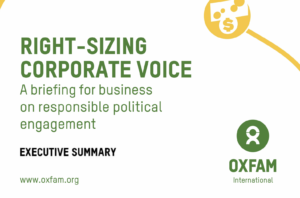 The Oxfam report, “Right-sizing Corporate Voice: A briefing for business on responsible policy engagement,” argues that political inequality is a major factor in economic inequality, and that the outsized role of corporations in political processes creates a systematic risk of policy capture, regardless of intent.
The Oxfam report, “Right-sizing Corporate Voice: A briefing for business on responsible policy engagement,” argues that political inequality is a major factor in economic inequality, and that the outsized role of corporations in political processes creates a systematic risk of policy capture, regardless of intent.
Specifically, the July 2024 report argues that government action is critical to protect human rights and reverse growing inequality, and that a stable political environment is vital to drive economic progress that rewards companies who pursue value creation over value extraction.
In practice, however, these types of government protections are effectively hindered by three key factors that contribute to the systemic risk of corporate policy influence:
- The magnitude of corporate political engagement relative to other actors
- The tendency to prioritize narrow, short-term financial interests
- Minimal transparency around political activities
The Oxfam report outlines specific risks in current practices for lobbying, advocacy, and political spending, such as creating internal or external misalignment or crowding out other voices. It argues that the inequality fomented by unbalanced representation is harmful for society, the environment, and public institutions and civic spaces. This also puts businesses at risk of heightened corruption or policies that exacerbate market failures.
Increasingly, companies face new calls from varied stakeholders — shareholders, customers, workers, and others — to consider the immediate and long-term impact of their political activity. These growing calls reflect emerging expectations for responsible corporate policy engagement that includes protections for society, the environment, and democracy.
Actionable Guidance for Responsible Political Engagement
The Corporate Political Responsibility Taskforce was honored to consult with the Oxfam team as they identified practical guidance for companies to avoid these risks and support a policy environment for shared prosperity.
Specifically, in encouraging companies to re-examine their political engagement, the Oxfam report recommends they anchor their actions in these principles, which draw on the Erb Principles for CPR and the Responsible Lobbying Framework:
- Legitimacy. Businesses need to have an authentic reason to engage politically. This may be on the basis of their contribution to an issue and the consequences of the issue for their commitments and the systems they rely on, including government institutions and civic space. Their engagement should always be justifiable in the public interest.
- Accountability. Responsibility for corporate political engagement, and specifically political spending and trade association memberships, should be subject to board oversight. Senior management should review the strategy and approach, and companies should ensure that all relevant departments as well as external stakeholders are involved.
- Consistency. Political engagement should be aligned with the company’s stated purpose, values, and commitments, across geographies, and include third parties, particularly trade associations. Companies should establish clearly articulated mechanisms to address misalignment.
- Responsibility. Companies should look for opportunities to support multi-stakeholder groups pursuing positive economic and social outcomes, and for ways to engage other groups in the policymaking process. They must be aware of their impact and ensure that their political engagement:
- does not contribute to adverse human rights and environmental impacts;
- supports the integrity of government institutions and the policymaking processes on which we all rely, in line with UN Sustainable Development Goal 16 (peace, justice, and strong institutions);
- engages in advocacy and civic discourse in good faith;
- allows governments to correct market failures.
- Transparency. Companies should report regularly, comprehensively, openly, and honestly about their political activities to promote informed stakeholder decision-making and public trust. This should be done globally and at all levels of government where political engagement happens, and include comments on both the intended outcomes of the engagement undertaken and the results.
Leveraging Human Rights Due Diligence Processes as a Model
In outlining solutions, the Oxfam team points to the familiar experience of developing human rights due diligence as a way to tackle these issues and enable companies to align their political engagement with the protection of human rights, delivery of ambitious environmental goals, support for civic institutions, and the needs of society.
The first step is to map a company’s “political footprint,” as outlined by the Good Lobby. This helps the company identify where it may be exacerbating inequality and identify areas of misalignment or risk.
Moving Toward a More Dynamic and Transparent Market
The Oxfam report outlines essential actions for companies, providing guidance to help businesses support better policy outcomes that encourage social and environmental progress.
A deeper look shows that these will also foster the sort of dynamic economy where businesses thrive. As the report’s executive summary notes: “Every large company has a political footprint that it needs to take responsibility for. A new approach to corporate political engagement — building on existing frameworks and based on the familiar experience of developing human rights due diligence — is required. This will enable companies to align their political engagement with the protection of human rights, delivery of ambitious environmental goals, support for civic institutions and the needs of society.”
As part of a series of papers written to inform public debate on development and humanitarian policy issues, the Oxfam report has a strong U.S. focus but applies wherever companies are engaging with governments. It is intended for leaders in government affairs, sustainability, and other departments involved in business political engagement, especially those at large multinational corporations.